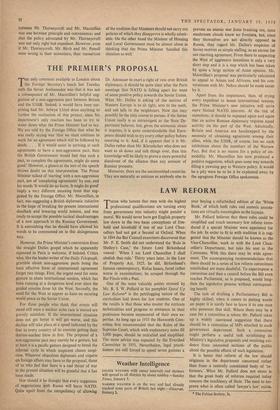THE PREMIER'S PROPOSAL
THE only comment available in London about the Foreign Secretary's lunch last Tuesday with the Soviet Ambassador was that it was not a consequence of Mr. Macmillan's helpful sug- gestion of a non-aggression pact between Britain and the USSR. Indeed, it would have been sur- prising had Mr. Selwyn Lloyd done anything to further the realisation of this project, since his department's only reaction has been to try to water down what the Prime Minister had to say. We are told by the Foreign Office that what he was really saying was 'that we must continue to work for an agreement which will be followed by deeds. . . . If it would assist in arriving at such agreements to have a non-aggression pact, then the British Government would feel that such a pact, to complete the agreements, might do some good.' However, a glance at the text of the speech throws doubt on this interpretation. The Prime Minister talked of 'starting' with a non-aggression pact, not of 'completing agreements' by one, and his words 'It would do no harm. It might do good' imply a very different meaning from that sug- gested by the Foreign Office. Mr. Macmillan, in fact, was suggesting a British diplomatic initiative in the hope of breaking the present international deadlock and lowering world tension, and was ready to accept the possible tactical disadvantages of a new approach to the Russian Government. It is astonishing that he should have allowed his words to be commented on in this disingenuous way.
However, the Prime Minister's conversion from the straight Dulles gospel which he apparently espoused in Paris is welcome, if belated. Critics who, like the leader-writer of the Daily Telegraph, grumble about non-aggression pacts being the least effective form of international agreement forget two things. First, the urgent need for some gesture to abate international tension, which has been running at a dangerous level ever since the guided missiles fever hit the West. Secondly, the need for the West to appear as keen on securing world peace as the Soviet Union.
For those people who think that events will stand still once a nuclear arms race is started are gravely mistaken. If the international situation does not get better it will get worse, and this decline will take place at a speed indicated by the fear in every country of its enemies getting their thermo-nuclear blow in first. The proposal of a non-aggression pact may merely be a gesture, but at least it is a pacific gesture designed to break the infernal cycle in which suspicion chases suspi- cion. Whatever objections diplomats and experts on foreign affairs may have to the proposal, those of us who feel that there is a real threat of war in the present situation will be grateful that it has been made.
Nor should it be thought that every suggestion of negotiations with Russia will harm NATO. Quite apart from the inexpediency of allowing Dr. Adenauer to exert a right of veto over British diplomacy, it should be quite clear after the Paris meetings that NATO is falling apart for want of some positive policy towards the Soviet Union. What Mr. Dulles is asking of the nations of Western Europe is to sit tight, arm to the teeth, and not talk to the neighbours. Now this may possibly be the only course to pursue, if the Soviet Union really is as intransigent as the State De- partment believes; but, given the economic strain it imposes, it is quite understandable that Euro- peans should wish to try every other policy before resorting to it. And, if it appears that it is Mr. Dulles rather than Mr. Khrushchev who does not want to sit down and talk things over, then this knowledge will be likely to prove a more powerful dissolvent of the alliance than any amount of Russian pressure.
Moreover, there are the uncommitted countries. They are naturally as anxious as anybody else to prevent an atomic war from breaking out, since mushroom clouds know no frontiers, but, since they themselves are not directly opposed to Russia, they regard Mr. Dulles's suspicion of Soviet motives as simple stalling, as an excuse for • not reaching agreement. From there to suspecting the West of aggressive intentions is only a very short step and it is a step which has been taken by quite a large section of Asian opinion. Mr. Macmillan's proposal was particularly calculated to appeal to Asians and Africans, and his con- versations with Mr. Nehru should be made easier by it.
Apart from the importance, then, of trying every expedient to lessen international tension, the Prime Minister's new initiative will serve more limited NATO interests. At the risk of monotony, it should be repeated again and again that an active Russian diplomacy requires equal activity on the part of the West. Admittedly, Britain and America are handicapped by the necessity of obtaining agreement among their allies, while the USSR, of course, has no such inhibitions about the members of the Warsaw Pact. But that is no reason for a policy of im- mobility. Mr. Macmillan has now produced a positive suggestion, which goes some way towards filling a yawning gap in Western policy. It would be a pity were he to let it be explained away by the egregious Foreign Office spokesman.


































 Previous page
Previous page